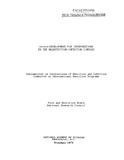Mostrar el registro sencillo del ítem
Program development for interventions in the nutrition-infection complex
| dc.creator | Keusch, Gerald T. | |
| dc.creator | Katz, Michael | |
| dc.creator | Koster, Frederick T. | |
| dc.creator | Mata Jiménez, Leonardo | |
| dc.creator | Rosenberg, Irwin H. | |
| dc.creator | Solomons, Noel W. | |
| dc.date.accessioned | 2014-12-08T17:43:23Z | |
| dc.date.available | 2014-12-08T17:43:23Z | |
| dc.date.issued | 1978 | |
| dc.identifier.uri | https://hdl.handle.net/10669/11201 | |
| dc.description | Reporte de investigación -- Universidad de Costa Rica, Instituto de Investigaciones en Salud. 1978 | es_ES |
| dc.description.abstract | The magnitude of malnutrition in the world is staggering. In addition to its major causative factors, which relate specifically to food availability at the household level, infectious diseases are an omnipresent and important inciter and contributor to malnutrition and its associated morbidity and mortality. Therefore, there are many factors that deserve attention during any examination of the malnutrition-infection complex. This report addresses only those factors expected to reduce the impact and burden of infectious diseases as a means to improving nutritional status and concentrates on recommendations for field-level implementation programs. To accomplish this, the subcommittee examined the following: • the interaction of nutrition and infection, which is called the malnutrition-infection complex; • targeting of programs to specific subsegments of the population, specifically to pregnant and lactating women, weanlings and children less than three years of age; • incorporation of adaptive research and impact evaluation into the program design; and • national planning and policymaking, local-level responsibility, outreach to the household level, and the establishment of linkages between the national and local activities . The subcommittee recommends that four elements be included in the program as a "package": • Prenatal control to increase maternal caloric intake through education and/or supplements (preferably using indigenous foods), however provided; to eradicate neonatal tetanus through immunization of the mother; to treat nutritional anemia and other specific deficiencies;to monitor weight gain by distributing take-home charts on which infant birth weight and growth can be recorded; and to initiate nutrition education, including concepts of breast-feeding, maternal requirements for lactation, weaning foods, oral rehydration therapy for dehydration, and postinfection convalescent nutritional care. • Emphasis on promoting breast-feeding, prolonging the practice as long as possible, and introducingsupplemental feeding practices with locally prepared indigenous foods. Completed growth charts and calculation of incremental growth will assist in the identification of growth-faltering infants, a group requiring extra attention. • Introduction of oral rehydration into households and instruction in its proper use in early therapy for acute diarrhea, along with continuation or early reinstitution of feeding for nutritional maintenance. • Programs to immunize children less than one-year-old with DPT (diphtheria-pertussis-tetanus), BeG (bacille Calmette Guerin), measles, and polio vaccines while the child is adequately nourished (as established by growth surveillance) and to maintain immunization records by means of growth charts that are completed in the home. Because there should be no dichotomy between doing and learning, the subcommittee recommends that the program include a research arm that would seek the information necessary to shape and define efforts to achieve maximum efficiency and success. | es_ES |
| dc.description.sponsorship | Universidad de Costa Rica. National Academy of Sciences. This study was supported by Contract AID/TA-C-1428 with the Agency for International Development. | es_ES |
| dc.language.iso | en_US | es_ES |
| dc.publisher | National Academy of Sciences, noviembre 1978 | es_ES |
| dc.subject | Nutrición del Niño | es_ES |
| dc.subject | Child Nutrition | es_ES |
| dc.subject | Prenatal Control | es_ES |
| dc.subject | Prenatal Nutrition | es_ES |
| dc.subject | Breast-Feeding and Weaning | es_ES |
| dc.subject | Oral Rehydration for Acute Diarrheal Disease | es_ES |
| dc.subject | Immunization | es_ES |
| dc.subject | DPT (diphtheria-pertussis-tetanus) | es_ES |
| dc.subject | BeG (bacille Calmette Guerin) | es_ES |
| dc.subject | Nutritional care | es_ES |
| dc.title | Program development for interventions in the nutrition-infection complex | es_ES |
| dc.title.alternative | Food and Nutrition Board National Research Council | en |
| dc.type | informe científico | |
| dc.description.procedence | UCR::Vicerrectoría de Investigación::Unidades de Investigación::Ciencias de la Salud::Instituto de Investigaciones en Salud (INISA) | es_ES |
Ficheros en el ítem
Este ítem aparece en la(s) siguiente(s) colección(ones)
-
Nutrición [253]


